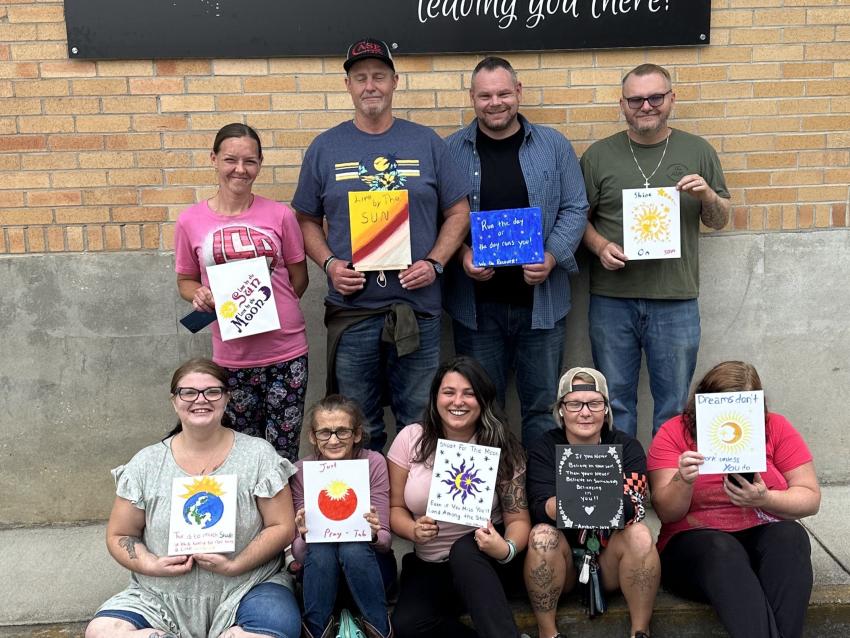
The Hub Expands Recovery Support Across Eastern Kentucky
Recognizing the critical need for accessible and holistic support in addressing substance use and overdose disparities across Kentucky, the Kentucky Injury Prevention and Research Center (KIPRC) awarded $170,000 per year for five years in Overdose Data to Action (OD2A) funding to the Kentucky River District Health Department, which serves Knott, Lee, Leslie, Letcher, Owsley, Perry and Wolfe Counties. This funding, part of a $27 million cooperative agreement from the Centers for Disease Control and Prevention to the university of Kentucky Research Foundation and KIPRC supports three full-time recovery navigators at The Hub in Beattyville, KY.
The Hub’s mission is simple yet impactful: meeting individuals where they are but not leaving them there. Since its opening in 2022, The Hub has worked to provide holistic, person-centered care to those in need by offering a broad range of services that address addiction, hunger, homelessness, mental health, employment, and housing.
Over the past year, more than 5,000 coordinated care instances have been delivered and 250 individuals have been linked to critical substance use disorder treatment and recovery services.
Role of Recovery Navigators
Recovery navigators play a front-line role in bridging the gap between active addiction and access to comprehensive care, guiding participants in identifying barriers to progress and finding sustainable ways to address those barriers.
“Having the partnership with OD2A and other partners has allowed us the staffing and the ability to reach more individuals with that linkage to care that’s so important,” said JoAnn Fraley, director of The Hub. “It also allows us to create that holistic approach, because for services we don’t provide within The Hub, we depend on our community partners to provide through warm handoffs.”
Community partnerships are the backbone of The Hub’s approach, ensuring that every individual receives wrap-around care and support on their journey to recovery. The HEAL Consortium, another partner of the Hub in Letcher County, has been working for over five years to bring resources into the county for those in addiction and recovery and played a large role in helping establish the Hub.
A dedicated team of volunteers and staff also works to provide ongoing assistance, fostering community partnerships to meet the range of needs of those in recovery. Together, they create a supportive network that helps individuals rebuild their lives with stability and hope.
The Hub's non-coercive approach allows participants to access harm reduction services without the pressure to change immediately.
“We meet people where they are, offering support without judgment,” said JoAnn. “Our goal is to provide what they need, when they need it, in a way that empowers them.”
For those ready to pursue recovery, The Hub responds quickly with comprehensive support at every stage, ensuring individuals receive the care and resources they need to move forward.
Tailoring Services to Unhoused Populations
"At The Hub, we focus on meeting basic needs first—food, clothing, and shelter. This helps us build trust through rapport, which is essential before we can address larger barriers like mental health and addiction,” said JoAnn. “By working in this way, we've seen real success in helping individuals transition from homelessness to housing, sobriety, and ultimately, self-sufficiency.”
Central to the services provided is the understanding that food serves as a foundational tool for addressing other barriers individuals face. Offering meals not only meets an immediate need but also fosters trust with participants. These shared moments during meals create a supportive environment, making it easier to engage individuals in deeper interventions and further steps in their recovery process.
Expansion to Letcher and Owsley Counties
The program is expanding its reach to Letcher and Owsley Counties, providing vital services to more communities.
“The Hub model is not designed to recreate the wheel in the communities but to enhance existing services, and if there’s a gap, we look for solutions to fix that,” JoAnn said. “Each community has unique needs, and solutions must be found within the community.”
In Letcher County, operations began on Oct. 3 and the facility is now fully operational. The program is partnering with the Eastern Kentucky Concentrated Employment Program and Southeast Community and Technical College to offer workforce training and apprenticeship opportunities, empowering individuals with the skills they need for long-term success.
In Owsley County, preparations are well underway, and the facility is expected to open soon.
The Hub’s ultimate goal is to expand its model to every county in the region, ensuring that more communities have access to its life-saving services. By tailoring programs to address the unique needs of each community, The Hub remains responsive and adaptable in its approach.
“Each community is different and has their own unique needs, so, with that being said, if there’s a gap in services, we will figure out a way to fix it on a community level. We are all in this together and that’s the approach I would like to keep,” shared JoAnn.
For more information about The Hub, please contact JoAnn at 606-216-6483 or reach The Hub in Lee County directly at 606-919-1338.
KIPRC is a unique partnership between the Kentucky Department for Public Health (DPH) and the University of Kentucky’s College of Public Health. KIPRC serves both as an academic injury prevention research center and as the DPH’s designee or “bona fide agent” for statewide injury prevention and control.
This project is supported by the Centers for Disease Control and Prevention (CDC) of the U.S. Department of Health and Human Services (HHS) as part of cooperative agreement 1 NU17CE010186 totaling $10,814,838 with 0% financed with nongovernmental sources. The contents are those of the author(s) and do not necessarily represent the official views of, nor an endorsement by, CDC, HHS, or the U.S. government. For more information, please visit CDC.gov.